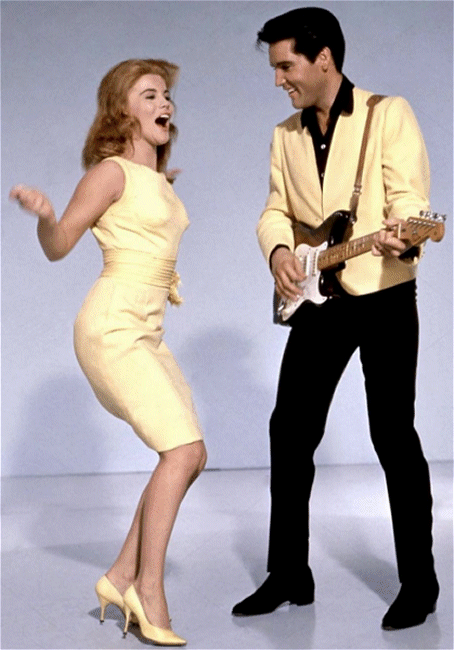 |
The 86-minute MGM film, (also known as ‘Love in Las Vegas’ in the
U.K.), was released in April, 1964. It was originally going to be
called ‘The Only Girl In Town.’ A single featuring the title track,
coupled with ‘What’d I Say?’ was a chart hit and the EP was issued
in America in July 1964 on RCA EPA-4382. The tracks on the EP were:
‘If You Think I Don’t Need You’, ‘I Need Somebody To Lean On’, ‘C’mon
Everybody’ and ‘Today, Tomorrow and Forever'.
On 4th July it had a one-week residency in the charts in the No92
position – which is probably why RCA decided not to release a soundtrack
album at the time. Other songs in the film included ‘The Lady Loves
Me’ and ‘Santa Lucia.’
‘Viva Las Vegas’, the title song, was penned by Doc Pomus and Mort
Schuman in July 1963. It was issued as a single with the Ray Charles
number ‘What’d I Say?’ as the flip.
During his performance of ‘What’d I Say?’ in the film, Elvis is backed
by The Carole Lombard Quintet and The Jubilee Four. Pomus and Schuman
also penned ‘I Need Somebody To Lean On’, a ballad which Elvis sings
as he takes a melancholy walk through an empty, dimly lit nightclub.
Red West and Joe Cooper penned ‘If You Think I Don’t Need You’ and
Joey Byers penned ‘C’mon Everybody’ a duet between Elvis and Ann-Margret.
The other duet was ‘The Lady Loves Me,’ which was never issued commercially
at the time due to contractual problems. ‘Today, Tomorrow and Forever’
was penned by Bill Grant, Bernie Baum and Florence Kaye and is a ballad
on which Elvis is backed by The Jordanaires. The trio also penned
‘Night Life,’ a number which was cut from the final print of the film,
but was eventually issued on an Elvis album in 1968.
Elvis himself arranged the version of the old Italian folk song ‘Santa
Lucia’ which he sings partly in Italian with banjo backing, with Ann-Margret
humming in the background. There is also a medley of ‘Yellow Rose
of Texas’/’The Eyes of Texas.’ Three numbers recorded for the film
weren’t included in the finished movie: ‘Do The Vega’, ‘Night Life’
and ‘You’re the Boss’. The bootleg album issued in America by Lucky
Records in 1979 contains no less than 19 cuts, including radio spots
advertising the film, outtakes recorded for the film and two solo
numbers by Ann-Margret, ‘Appreciation’ and ‘My Rival’. |
|
The film was produced by Jack Cummins and George Sidney, directed
by Sidney with a screenplay by Sally Benson. It starred Elvis as Lucky
Jackson, with Ann-Margret as Rusty Martin, Cesare Danova as Count
Elmo Mancini, William Demerest as Mr. Martin and Nicky Blair as Shorty
Farnsworth. In the movie, Lucky Jackson has one ambition – to be the
world racing champion.
To achieve this, he and his mechanic, Shorty Farnsworth, are on their
way to Las Vegas to enter their car in the annual Grand Prix. Lucky
has won a considerable amount of money in a gambling saloon to enable
him to do this. Arriving in Las Vegas, Lucky meets Count Elmo Mancini,
the Italian racing champion, who is preparing his Ferrari for the
big race. Lucky turns down Mancini’s offer, which involves taking
the other cars out of the competition by hard driving so that Mancini
can win with little effort.
Their minds are taken off racing when a young lovely named Rusty Martin
asks them to fix her sports car. Lucky tries to delay her by loosening
a wire, but Mancini fixes the car and Rusty is on her way before Lucky
can learn her name. Guessing that she’s a showgirl, Lucky and Mancini
begin a tour of the fabulous Las Vegas strip, but after viewing hundreds
of chorus girls, they still haven’t located Rusty.
The next morning Lucky finds her by accident – she is the swimming
instructor at the hotel where he is staying. The reunion is a happy
one for Lucky – until he falls into the pool and the money he and
Shorty were going to use for a racing engine is sucked down the drain.
To pay his hotel bill he and Shorty become waiters. This makes them
eligible to compete for $21,500 in prizes at the annual Employee’s
Talent Competition.
On his first day off, Lucky and Rusty have their first date and fall
in love. On the night of the talent show, Lucky wins first prize,
edging out Rusty. But instead of winning cash, Lucky receives a gold
cup and a honeymoon in Monaco. Rusty wants Lucky to give up racing
because she fears he will get himself killed.
She tries to win him over through jealousy by carrying on with the
Count. Their candle lit dinner is turned into a riot when Lucky substitutes
for the hotel’s regular waiter. Finally, just hours before the big
race, the money turns up for Lucky’s engine (secretly financed by
Rusty’s father) thanks to Rusty’s inadvertent help. Lucky’s car makes
the starting gate on time and, in a wild and furious race, Lucky eventually
wins and returns to marry Rusty. |
|
|
